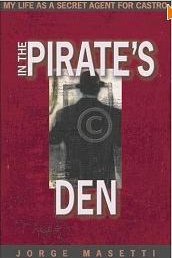Jorge Masetti
In the Pirate's Den

He took life as a game, took sides with the socialist revolution, and got cheated on. Late did he realize that life is a man's job, and that the revolution was a one man's game: Castro's.
The true nature of the revolution: "The revolution was a cover for committing atrocities without the slightest vestige of guilt ... we were young and irresponsible. We were pirates. We formed our own caste ... we belonged to and believed in nothing -no religion, no flag, no morality or principle. It's fortunate we didn't win, because if we had, we would have drowned the continent in barbarism."
The candidness with which the author details his role in the socialist tentacles of Castro in Latin-America and Italy, makes the book a very entertaining, as well as educational, experience.
Masetti's middle-class family life is typical of would-be revolutionaries in Latin America: petit-bourgeois. Cafés, promiscuity, idelness, not wanting to work, irresponsibility, and a desire for adventure (whomever it hurts): "After smoking (marihuana) I felt like Che Guevara, Jim Morrison, Fidel Castro, Napoleon -all of them rolled together." His first girl-friend is his female version: "Her parents were rich and gave her everything except affection." The perfect breeding ground for terrorist punks.
"All I wanted was to become a member of a military squad." Once he's past the leftist, revolutionary scheme, the world opens for him: "Without realizing it, I had just entered the world of 'important people -the nomenklatura." What about equalitarianism? "They gave me a charge card that was like a magic key to the good life ... I tried to be careful not to consume more than was necessary. I knew there were shortages in Cuba and that the Cubans were forbidden the delicacies to which I had access. What surprised me was how the party officials who were assigned to me took advantage of the situation."
Cowboy mentality and irresponsibility: "When I saw what we had, I almost went crazy with joy ... pistols, revolvers, rifles, submachine guns..."
How to co-opt gullible peons in the West: "Journalists, businessmen, politicians: they were all potential contacts. If they showed the slightest sympathy for the Cuban revolution, they would be given 'the treatment' ... There may be many people who would be surprised to see that they had files and to learn that they were Cuban agents without knowing it."
The socialists' love of luxuries: "When he (Pelado) returned to managua after the assassination of Somoza, the Sandinistas had rewarded them with the rank of major ... like other comandantes, he lived in a luxurious house in Managua and was chauffered around in a Mercedes Benz."
"The children of high class officials in Cuba usually behave like a caste apart, flaunting their dynastic privileges."
Imperialism: "Angola was not Cuba, nor even Nicaragua ... many of the indigenous combatants were not volunteers but forcibly recruited slaves ... for the Angolan people, the Cuban presence meant the continuation of war, when their deepest desire was for peace."
The real Che: "That's the method the Guevarista culture recommends: shoot the weak, those who express doubt."
Author's final confession and regret: "(In Miami) I met former Cuban political prisoners from the first years of the revolution. I was surprised to find that these men had fought against Batista, inspired by the same idealism that guided other young people of Latin America in their fights against the continent's dictatorships. But what surprised me most was the fact that they welcomed me into their midst in spite of the fact that I was the spoiled child of those who had imprisoned them." "During those years of conflict, all we did was destroy. We built nothing."
Awesome book. Read it and don't hide anymore from the truth.
